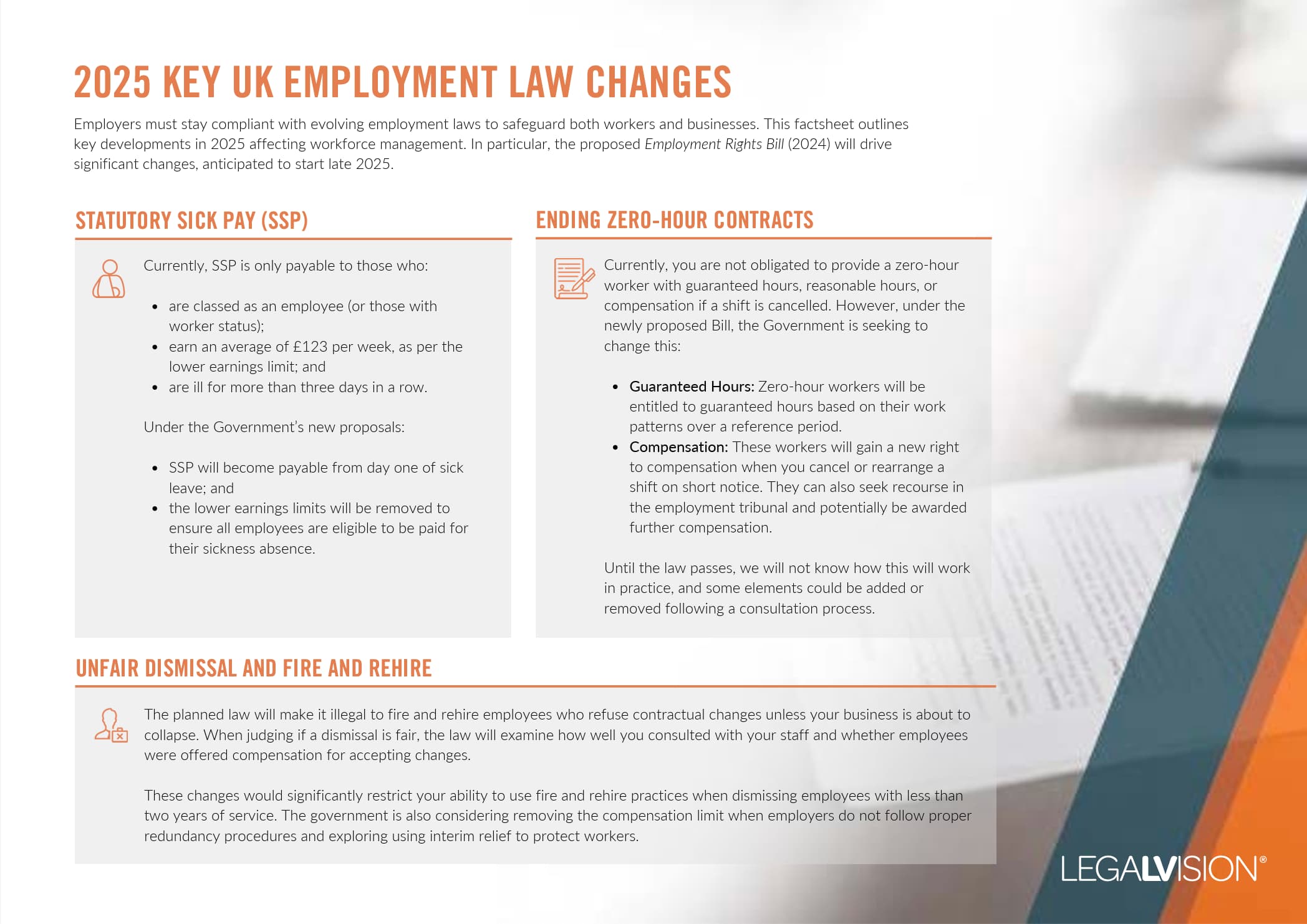In Short
- Reasonable management instructions must be lawful, align with job roles and not compromise health or safety.
- They should be clear, consistent, and fair to avoid grievances, legal claims or reduced morale.
- Employers should review and document management instructions to ensure compliance and maintain trust.
Tips for Businesses
Review job descriptions regularly to ensure instructions align with roles. Train managers to issue clear and consistent directives, considering employee rights. Encourage feedback and open communication to maintain a fair and compliant work environment. Seek legal advice if unsure about management instructions.
In the UK employment landscape, the concept of ‘reasonable management instruction’ is crucial in maintaining a productive and harmonious work environment. It is also the cornerstone of confidence in an employment relationship, as it dictates what you can and cannot demand of your employees. This article explores what constitutes a reasonable management instruction, its legal implications, and key considerations for employers.
What are ‘Reasonable Management’ Instructions?
A reasonable management instruction is a lawful and appropriate directive given by an employer or manager to an employee within the scope of their employment. These instructions should align with the employee’s job description, contractual obligations and workplace policies.
Legal Framework
In the UK, the concept of reasonable management instructions is not explicitly defined in statute but has been developed through case law and employment tribunal decisions. The key principles are rooted in the:
- Employment Rights Act 1996;
- Equality Act 2010; and
- Health and Safety at Work Act 1974.
These laws provide the foundation for understanding what can be considered reasonable in the context of management instructions.

This factsheet outlines key developments in 2025 affecting workforce management.
Characteristics of Reasonable Instructions
To be deemed reasonable, management instructions should generally:
- be lawful and ethical;
- fall within the scope of the employee’s duties;
- not compromise the employee’s health and safety;
- be clear and unambiguous;
- be consistent with company policies and procedures; and
- not discriminate against protected characteristics.
Common Examples
Reasonable management instructions might include:
- requesting an employee to work overtime within contractual limits;
- assigning new tasks within the employee’s skill set;
- implementing dress codes or safety equipment requirements;
requesting attendance at training sessions or team meetings; - enforcing company policies on internet usage or confidentiality.
Considerations for Employers
When issuing management instructions, you should keep the following in mind:
- Clarity: Ensure instructions are clear, specific and easily understood.
- Consistency: Apply instructions fairly across the workforce to avoid claims of discrimination or unfair treatment.
- Proportionality: The instruction should be proportionate to the intended outcome and not overly burdensome.
- Flexibility: Consider individual circumstances where reasonable adjustments may be necessary.
- Communication: Explain the rationale behind instructions to foster understanding and cooperation.
- Documentation: Keep records of instructions given, particularly in case of a potential dispute.
You should be care if you are providing instructions that significantly differ from the roles and responsibilities of your employee. Additionally, you should avoid directives that conflict with their personal beliefs or potentially expose them to risk. For example, asking a vegetarian employee at a food-processing plant to handle meat products could be considered an unreasonable instruction if it was not part of their original job description. This is because it would conflict with their personal beliefs.
Consequences of Unreasonable Instructions
Issuing unreasonable management instructions can lead to:
- employee grievances or complaints;
- decreased morale and productivity;
- potential legal claims, such as constructive dismissal or discrimination;
- damage to company reputation; and
- breaching the implied duty of confidence which is inherent in all employment relationships.
For example, if you consistently ask an employee to work late without pay, they may suffer from stress and burnout and eventually resign. This could result in a constructive dismissal claim.
Best Practices for Employers
In general, you must strike a balance between exercising your managerial prerogative and respecting employee rights. This involves:
- fostering open communication channels;
- regularly reviewing and updating policies;
- providing management training on issuing appropriate instructions; and
- implementing fair grievance procedures.
To ensure management instructions remain reasonable, you should regularly review your job descriptions and contracts to ensure that you provide instructions within the scope of your employees’ roles. Additionally, you should seek feedback from your employees on the practices in your workplace. Another good practice is seeking legal advice to stay up to date with employment law changes and new obligations that may arise.
Employees Refusing Instructions
If an employee refuses to follow a reasonable management instruction, you should:
- investigate the reasons for the refusal;
- consider if adjustments can be made;
- explain the potential consequences of continued refusal; and
- follow proper disciplinary procedures if necessary.
Remember to be transparent with your employees and encourage two-way communication.
Key Takeaways
Understanding what constitutes a reasonable management instruction is crucial for maintaining a productive and legally compliant workplace in the UK. By considering the legal framework, employees’ rights and best practices, you can issue instructions that are both effective and fair. Remember, the key lies in clear communication, consistency and a willingness to adapt when necessary.
If your employees are refusing instructions, our experienced employment lawyers can assist as part of our LegalVision membership. For a low monthly fee, you will have unlimited access to lawyers to answer your questions and draft and review your documents for a low monthly fee. So call us today on 0808 196 8584 or visit our membership page.
Frequently Asked Questions
Dress codes must comply with the Equality Act 2010, avoiding discrimination based on protected characteristics like gender or religion. Consistent application and reasonable adjustments are key.
Investigate the refusal, ensure the instruction is lawful, and consider adjustments if necessary. Communicate clearly, and follow disciplinary steps if the refusal persists. Additionally, you should document all interactions as evidence in the event of a claim against you.
We appreciate your feedback – your submission has been successfully received.











